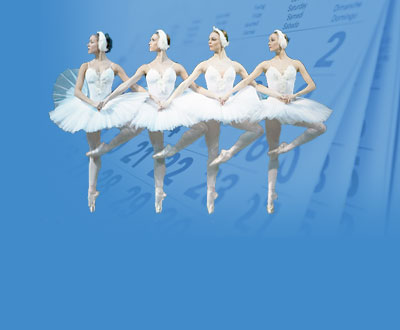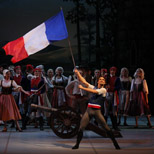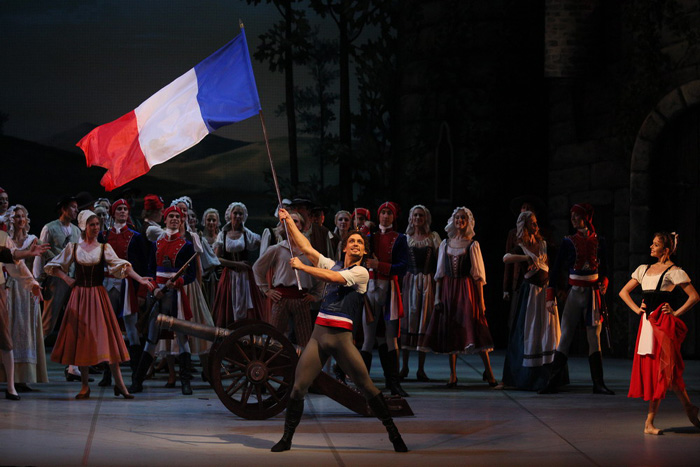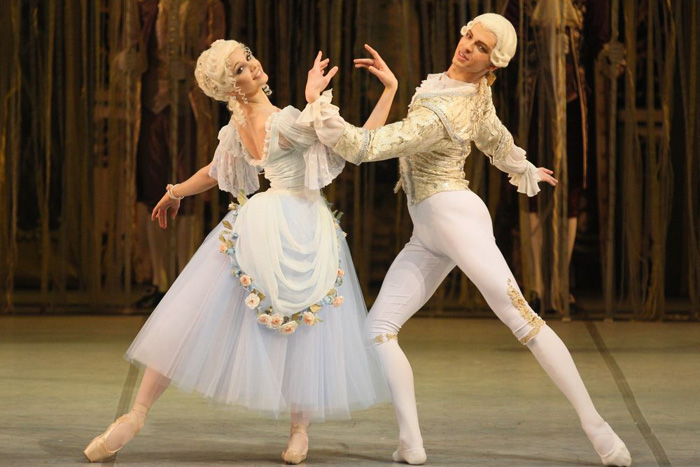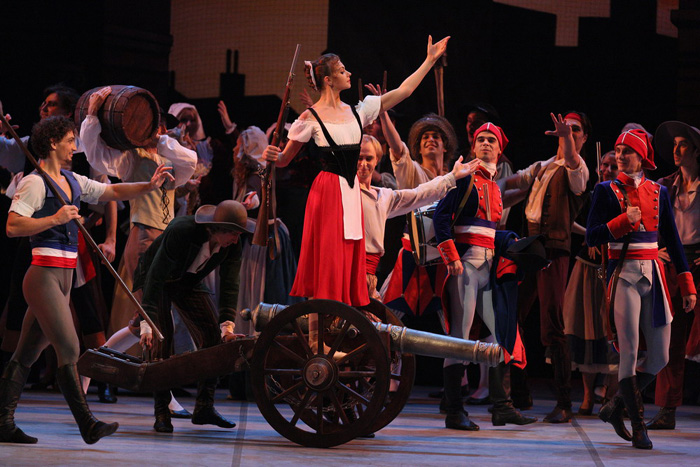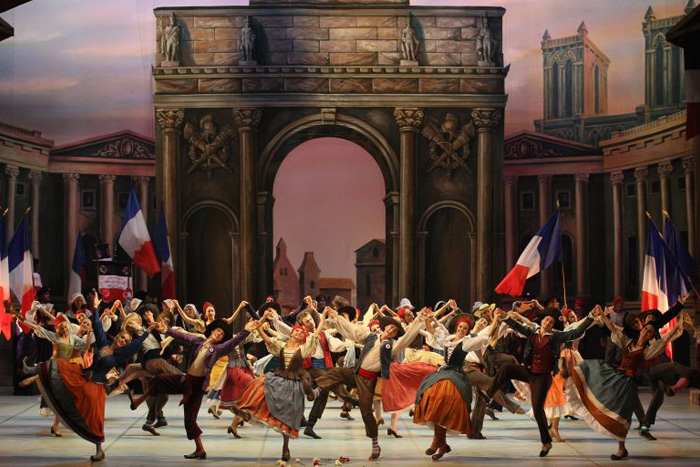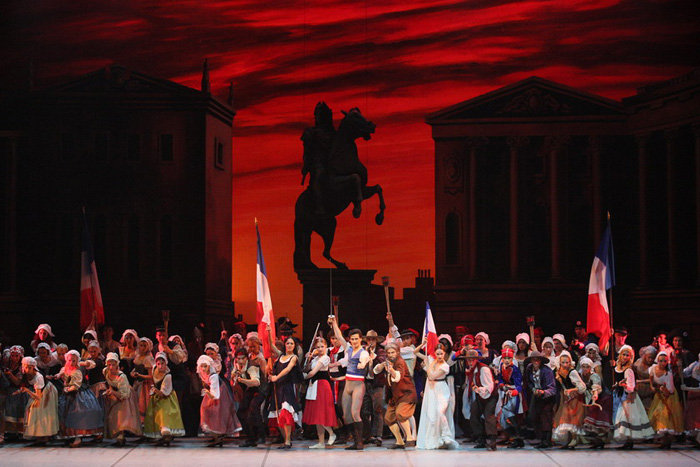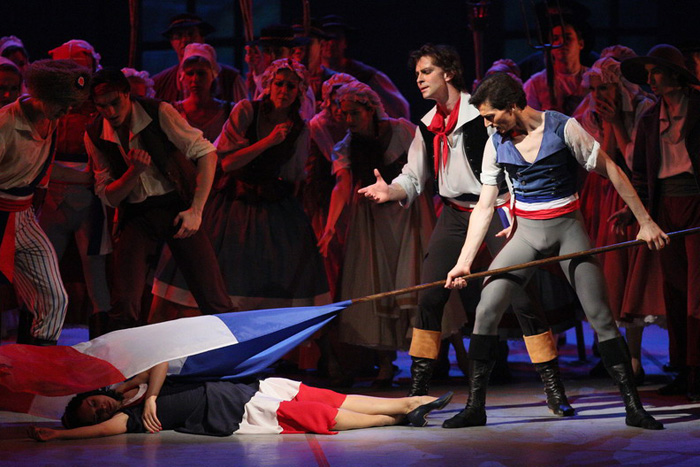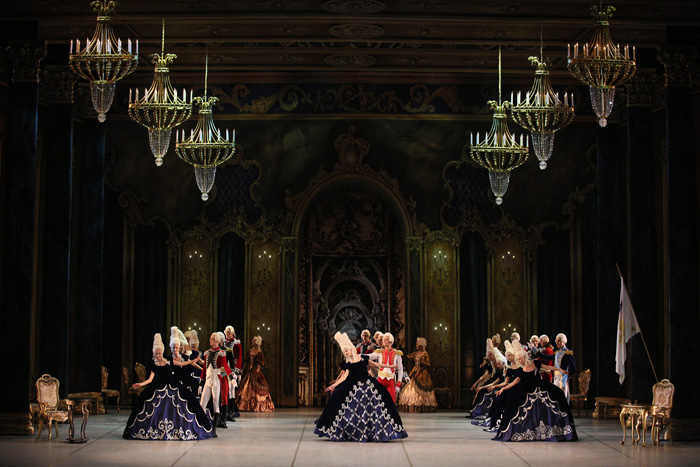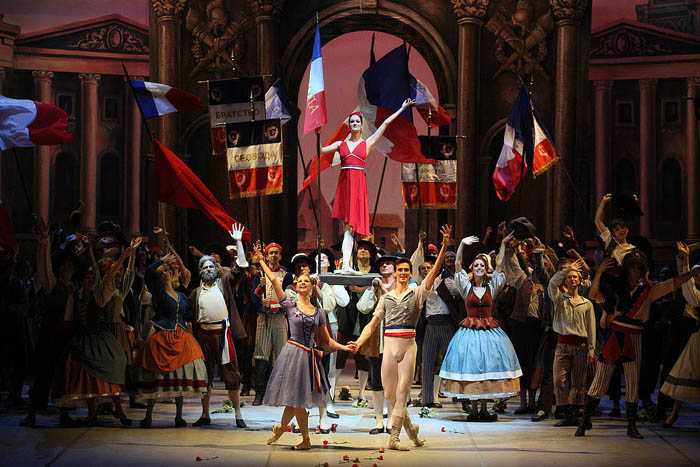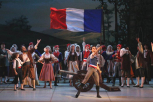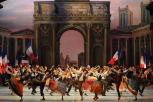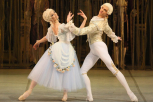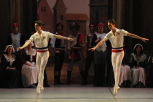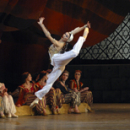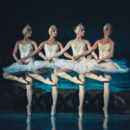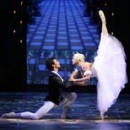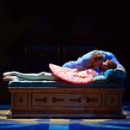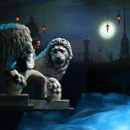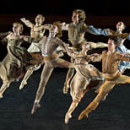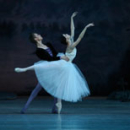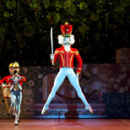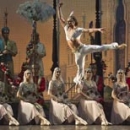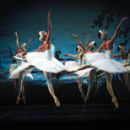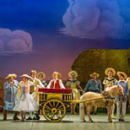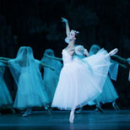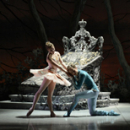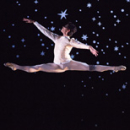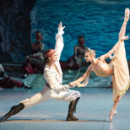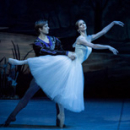Schedule of all St. Petersburg theaters on
one page >>
Please enter theatre's name, actor's name or any other keyword
The Flames of Paris (Mikhailovsky Theatre, ballet)
Genre: Ballet Age restriction: 12+ Length: 2 hours 10 minutes Intermissions: 2 Opening night: 22 July 2013
Credits
Libretto: Nikolay Volkov and Vladimir Dmitriev after the novel Les Rouges du Midi by Felix Gras revised by Mikhail Messerer
Choreography: Vasily Vaynonen revised by Mikhail Messerer
Stage and Costume Design: Vladimir Dmitriev
Staging: Mikhail Messerer
Music Director: Valery Ovsyanikov
Music Director’s Assistant: Valentin Bogdanov
Revival of the Stage and Costume Design: Vyacheslav Okunev
Assistants in the revival: Vyacheslav Lebedev, Anna Kotlova
Lighting Designer: Alexander Kibitkin
Producer: Dmitry Astafyev, Dr. habil
Assistants of the ballet master: Anna Razenko, Evgeny Popov
Premiere at the Mikhailovsky Theatre: July 22, 2013
The historical fresco depicting the events of the French Revolution has returned to the stage, fanning the audience with the flames of the struggle for freedom and personal dignity. Vasily Vainonen’s choreography, hailed as the most outstanding achievement of Soviet ballet, has been recreated by Mikhail Messerer.
Scene 1
Summer of 1792. A suburb of Marseilles. Edge of the woods near the castle of Marquis de Beauregard. Out of the woods there appears Gaspar and his children: 18-year-old Jeanne and 9-year-old Jacques, who pull a cart of firewood. Jeanne plays with Jacques. The boy jumps over the faggot bands. The sound of the horn heralds the return of the Marquis from hunting. Gaspar and the children are in a hurry: they try to gather the faggot bands and leave. The Marquis and the huntsmen appear from the wood. De Beauregard is furious with the peasants gathering the faggot in his wood. Gaspar is beaten up by the hunters from the Marquis’s suite; the huntsmen turn the cart over. Jeanne is trying to stand up for her father, the Marquis lets drive at her too, but on hearing the sound of the revolutionary song he hurries to his castle.
A squad of the Marseillais led by Philippe move through the woods on their way to Paris to help the revolutionary people. The Marseillais help Gaspar and Jeanne put the cart back on its wheels and put the faggot bands on it. Jacques is enthusiastically waving the revolutionary flag, given to him by one of the revolutionaries. At the time the Marquis manages to flee from his castle through the secret door.
The peasants greet the soldiers from Marseilles. Philippe calls them to joins the squad. Gaspar and his children join the Marseillais. All of them move off to Paris.
Scene 2
A ball at the Versailles palace. Ladies of the court and the officers of the royal guard dance the sarabande. When the dance is over, the master of ceremonies invites the guests to see the performance of the court theatre. Actors Diana Mireille and Antoine Mistral perform an intermezzo, performing the victims of Cupid.
King Louis XVI and Queen Marie Antoinette arrive accompanied by their retinue. The officers raise their glasses to the prosperity of the monarchy. Marquis de Beauregard, who has just arrived from Marseilles, enters. He shows the tricolour banner with the slogan “War to the palaces, peace to the huts!” and throws it at the King’s feet. The Marquis kisses the royal standard by the throne and reads out the message to the Prussians, written by him, in which Louis XVI should call Prussia to send troops to France and put an end to the revolution. The King is asked to sign the document. The King hesitates, but Marie Antoinette persuades him to sign the document. Marquis and the officers, in a burst of enthusiasm for monarchy, vow to fulfill their duty to the King. They draw their weapons and enthusiastically salute the royal couple. The Queen expresses her confidence in the loyalty of the officers. Louis is moved, he brings a handkerchief to his eyes.
The royal couple and ladies-in-waiting leave the ballroom. The footmen brings the tables in, more glasses to the monarchy are raised. The admirers of Diana Mireille invite the actors to take part in the celebration. They ask Mireille to dance. She and Antoine perform an improvised short dance, enthusiastically received by the audience.
The tipsy Marquis invites Mireille to dance, and she has to accept. His rudeness disgusts her, she would love to leave — but she shouldn’t. Diana tries to stay close to Mistral. He strives to distract the Marquis, but De Beauregard rudely pushes the actor away and several officers take Antoine back to the table. Ladies quietly leave the room. Finally Mireille finds a pretext to leave too, but the Marquis follows her.
Wine affects the guests, some of the officers fall asleep right at the table. Mistral notices the “Appeal to&ndsp;Prussia» left on the table. He starts reading it, first without thinking and then with more and more interest. The Marquis returns and notices the paper in the hands of Antoine. He runs amock, pulls out a gun and shoots the actor. Antoine is fatally injured. The sound of the gunshot wakes some officers up, they surround the Marquis and hurry him away.
Having heard the sound of the gunshot too, Mireille comes back. She sees Mistral’s lifeless body and tries to find out, if he’s still alive. But he is dead. She notices a piece of paper clutched in his hand and reads it. The sounds of La Marseillaise are heard. Now Mireille understands, why Mistral was killed, and she knows what she is to do. She takes the paper and leaves the palace.
Act II
Scene 1
At night. A square in Paris, where crowds of the citizens, the armed squads from provinces, including the Basques and men from Auvergne gather together. The Parisians are glad to see the squad from Marseille. A group of the Basques stands out by their readiness to fight. One of them is Teresa, an active participant of the street protests of the sans-culottes. Diana Mireille’s arrival stops the dances. She shows the crowd the appeal of the King to the Prussians, which confirms the betrayal of the aristocracy. People dance and sing La Carmagnole. Arms are distributed. Philippe calls to storm the Tuileries. Under the tricolour banners, singing the revolutionary Ça ira, the crowd moves to the King’s palace.
Scene 2
Crowds of the armed people dash to storm the palace. Marquis de Beauregard brings the Swiss Guard soldiers to the palace. At his command, the Swiss take the assigned positions. The officers walk the frightened ladies away. Suddenly the door flies open, the people burst into the chambers of the palace. Philippe bumps into Marquis de Beauregard. After a fierce fight with the Marquis Philippe knocks his sword aside, de Beauregard tries to shoot Philippe, but the crowd attacks him.
The Swiss, the last defenders of the King, are swept away. Teresa runs in holding the banner in her hands, and falls, shot dead by a bullet of an officer. The battle is over. The palace is captured. The Basques, Philippe, and Gaspar lift Teresa’s body over the heads, the people decline the flags.
Act III
People are celebrating the capture of the Tuileries on the square of the former King’s palace. The merry dances of the people alternate with the performances of the Paris actors.
Diana Mireille, surrounded by girls wearing ancient costumes, performs a dance with the tricolor flag that symbolizes the victory of the Revolution. Allegoric dances of Equality and Fraternity are performed. People shower Jeanne and Philippe with flowers: it’s also their wedding day. La Carmagnola is sung. People carry Diana Mireille as a symbol of freedom.
Video
You may also like
-
The Fountain of Bakhchisarai (Mariinsky Theatre, ballet)
Mariinsky (ex. Kirov) Ballet and Opera Theatre- Genre: Ballet
-
Swan Lake (Hermitage Theatre, ballet)
Hermitage Theatre- Genre: Ballet
-
Cinderella (Mikhailovsky Theatre, ballet)
Mikhailovsky (ex. Mussorgsky) Theatre- Genre: Ballet
-
The Sleeping Beauty (Hermitage Theatre, ballet)
Hermitage Theatre- Genre: Ballet
-
The Bronze Horseman (Mariinsky II New Theatre, ballet)
Mariinsky II (New) Theatre- Genre: Ballet
-
Romeo and Juliet (Mikhailovsky Theatre, ballet)
Mikhailovsky (ex. Mussorgsky) Theatre- Genre: Ballet
-
Giselle (Mariinsky Theatre, ballet)
Mariinsky (ex. Kirov) Ballet and Opera Theatre- Genre: Ballet
-
The Nutcracker (Hermitage Theatre, ballet)
Hermitage Theatre- Genre: Ballet
-
La Bayadère (Mikhailovsky Theatre, ballet)
Mikhailovsky (ex. Mussorgsky) Theatre- Genre: Ballet
-
The Little Humpbacked Horse (Mikhailovsky Theatre, ballet)
Mikhailovsky (ex. Mussorgsky) Theatre- Genre: Ballet
-
Spartacus (Mikhailovsky Theatre, ballet)
Mikhailovsky (ex. Mussorgsky) Theatre- Genre: Ballet
-
Swan Lake (Mikhailovsky Theatre, ballet)
Mikhailovsky (ex. Mussorgsky) Theatre- Genre: Ballet
-
La Fille mal gardée (Mikhailovsky Theatre, ballet)
Mikhailovsky (ex. Mussorgsky) Theatre- Genre: Ballet
-
Giselle (Hermitage Theatre, ballet)
Hermitage Theatre- Genre: Ballet
-
The Sleeping Beauty (Mikhailovsky Theatre, ballet)
Mikhailovsky (ex. Mussorgsky) Theatre- Genre: Ballet
-
The Nutcracker (Mikhailovsky Theatre, ballet)
Mikhailovsky (ex. Mussorgsky) Theatre- Genre: Ballet
-
Le Corsaire (Mikhailovsky Theatre, ballet)
Mikhailovsky (ex. Mussorgsky) Theatre- Genre: Ballet
-
Giselle, ou Les Wilis (Mikhailovsky Theatre, ballet)
Mikhailovsky (ex. Mussorgsky) Theatre- Genre: Ballet
-
Don Quixote (Mikhailovsky Theatre, ballet)
Mikhailovsky (ex. Mussorgsky) Theatre- Genre: Ballet
 en
en es
es